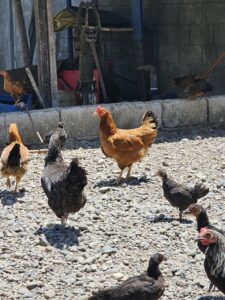No products in the cart.
Keeping hens for the purpose of collecting eggs is not only a valuable skill, but also an interesting and satisfying hobby in its own right. In addition to providing you with fresh eggs, laying hens can also provide you with free fertilizer, help keep pests at bay, and provide you with an endless amount of entertainment. This blog will focus on four different key points that we feel make raising chickens worth your time and hope that it will assist readers who do not have prior experience with chickens.
The production of eggs is what motivates the majority of people to start raising chickens. By raising your own chickens for eggs, you can avoid buying from the industrial farms that supply the vast majority of the eggs marketed in the United States. Hens used for egg production on industrial farms are often crammed into tiny cages where they have no room to spread their wings or move about. Pasture-raised eggs, from birds allowed space to scavenge for food, are more nutritious than industry-sourced eggs, according to a study conducted by Cambridge University in 2010. Pasture-raised eggs included twice as much vitamin E and long-chain omega-3 fatty acids. If you keep your chickens on certified organic chicken feed, you may ensure their health without sacrificing your commitment to organic agricultural practices.
The price of these healthier eggs may be more than that of conventional supermarket eggs, but they are nevertheless competitive with and often cheaper than the price of locally sourced, free-range eggs. Most people who maintain chickens in their backyards say they spend about $3 per dozen when they factor in the cost of food but not coop materials or other one-time charges. The going rate for a dozen eggs at most farmer’s markets is $5 or more.
 Fertilizer, aka black gold
Fertilizer, aka black goldThis is a fun tidbit for all of our fellow gardeners out there. In a little over a month, one chicken can create enough nitrogen fertilizer for a garden that is fifty square feet in size. Due to the significant amount of nitrogen that it contains, chicken manure is an essential ingredient in the fertilizer that you use in your garden. In addition to being beneficial for the compost pile, it also contains a lot of other beneficial nutrients. On a daily basis, a chicken will create waste that weighs an average of around a quarter of a pound.
Raising chickens would benefit greatly from a diet that includes scraps from your kitchen and garden. Being omnivores, they will eat almost everything, but caution must be taken when deciding what (and how much) to offer as table scraps. Keep in mind that a specially formulated chicken feed should make up the bulk of your chickens’ diet, as this will ensure that they get the proper quantity of protein and nutrients. Nonetheless, some scraps can be offered to add variety (and reduce your own table scraps!) to this daily feed. It’s highly recommended that you avoid things like uncooked and processed meats, avocados, onions, fried foods, dried beans, chocolate, strong tasting things like garlic, fish, and anything containing alcohol or caffeine as it’s all very harmful to chickens in one way or another.
Something you might not know is that commercial kitchens sometimes have food scraps that can be kept aside for chickens, our friends over at Vintage and Rustics do exactly that for their own flock of chickens.
Chickens will very happily help you out in the garden by consuming common garden pests such as beetles, cabbage worms, slugs, caterpillars, and many others as one of their food sources. Chickens, when given the opportunity, would gladly pick insects from your garden if they are given the freedom to explore. About 120 square feet of ground can be cleared of pests per week using just one chicken. If you want to get rid of squash that is infested with squash bugs or beans that are afflicted with Mexican bean beetles, placing the plants in the chicken yard will result in few survivors. In addition to their other uses, chickens help reduce the number of ticks that can be found on many rural homesteads. In the event that you bring in damaged hay to use as mulch or compost with an unknown past, you can let your chickens remove slugs, snails, weed seeds, and other unwelcome stowaways before you use it in your garden by letting them pick through it.
We hope this blog has been helpful, stay tuned for more chicken related blogs coming soon! Got more questions? Or a project you want to share with us? We here at Cat’s Claw Fasteners would love to hear all about it! Make sure to email them over to our Head Cat Collector, Ralph, at ra***@***************rs.com, read all our other blogs here and make sure to follow us on Facebook, Instagram, Pinterest, and Youtube!
Read Next: Wire and Its Uses: A Brief History
